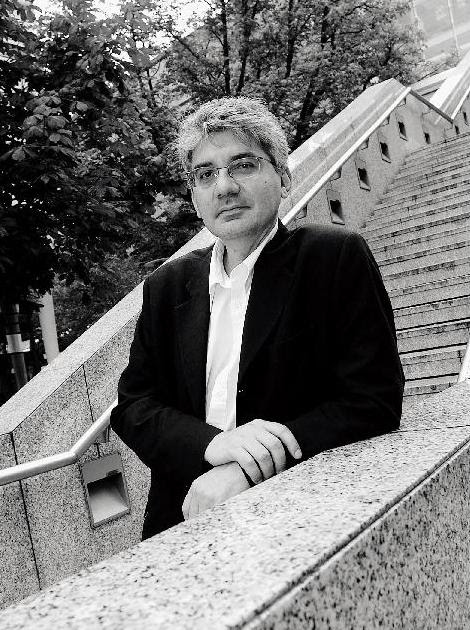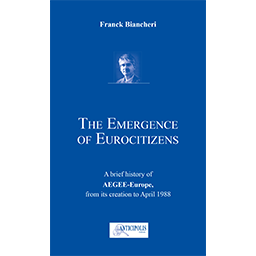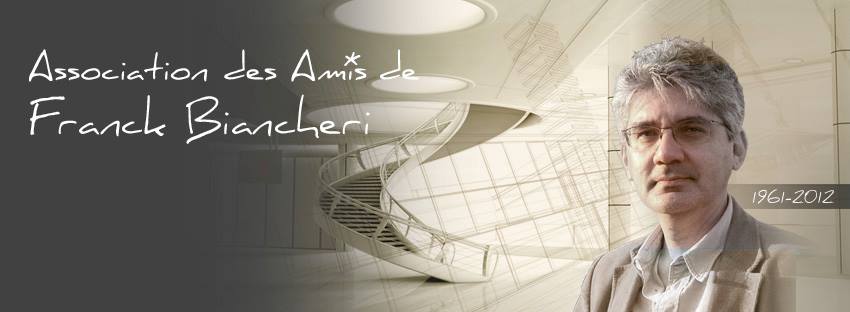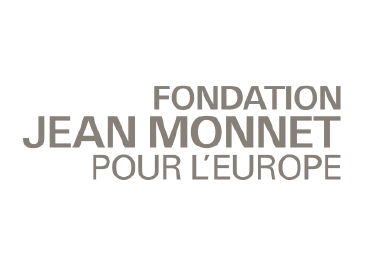[:en]
Jean Monnet, the inspirator and leading architect of the project, had to fight to overcome resistances, conformism, habits, and impose the foundations of the Community architecture and method.
This quote is taken from an article by Franck Biancheri of 19 October 2001 “Switching from EU to Euroland Daring the future” (you can read an extract below). In this article Franck Biancheri expresses all the esteem he had for the Founding Fathers of Europe, these “great men” and more particularly Jean Monnet. We are proud and happy that today his archives have found their way into the Jean Monnet Foundation for Europe in Lausanne, alongside the one whose power of imagination, intellectual audacity and political tenacity he admired, qualities in which he believes we must seek the message they have left us, and from which he has drawn his inspiration for his own struggle for the democratisation of Europe and his own battle for Erasmus, as one of the founding father of the programme. The donation agreement will be signed on March 22nd, we can only be heartly moved and grateful to the Foundation for inviting him to join their pantheon.
“Founders” think the future without being blinded by the past or future
Those whom novelty make anxious should not worry. Those current forms of the European construction which they are familiar with and which reassure them, result from radical breaks from the past or the present.
Contrary to what think or say the disciples of all sorts, ” great men “, ” founders “, ” leaders “, have an essential capacity to “envisage ruptures”, they do not cling to pre-established schemes, they can free themselves from a dominant thought, they are able to see the future without being blinded by the present and even less by the past.
And indeed the founders of the European construction were great men. Jean Monnet, the inspirator and leading architect of the project, had to fight to overcome resistances, conformism, habits, and impose the foundations of the Community architecture and method.
No doubt that he would be appalled today (eventhough maybe not surprised) to see the lack of imagination used to think the future of the European construction; the lack of audacity of the leaders; the terrifying conformism of these European institutions supposed to “shed light on the way”…; all of seem content to turn around the institutions and methods inherited from the 50’s, desperately seeking for the keys to the European 21st century.
He knew how to put together the riches of Europe then which control divided and opposed the States. Today, these riches are no longer our coal or steel, but our human resources (the grey cells) and our new technologies. It on these tracks that we should follow the inspiration of the Founding Fathers; it is in the power of their imagination, in their intellectual audacity and in their political tenacity that the message they left us should be sought for.. There it lies, the key to the future… not in the institutional forms nor in the dated treaties.
A good illustration of this is provided by the recent contribution of former French President Valéry Giscard d’Estaing in the newspaper Le Monde, where he states the fact that Jean Monnet himself found useful to create the European Summit initiated by Valéry Giscard d’Estaing. This shows that Jean Monnet himself was certainly not a prisonner of the model he had invented in the 50’s.
But the disciples (fake or true) always prefer to manage the heritage rather than undertake to reinvent the process. Founders are usually prefered in their momified form rather than as living spirits. As when it comes to the European construction today, it is clearly the case.
Franck Biancheri, 19 October 2001 in “Switching from EU to Euroland Daring the future” (LEAP2020)
[divider]
Read also: Happy birthday, Franck! We are currently taking an important step forward in the process of recognising Franck’s immense contribution to European history thanks to the Jean Monnet Foundation for Europe, which has done us the honour of welcoming the archives of Franck Biancheri alongside those of Jean Monnet. The signing of the agreement to donate our archives will give rise to a small solemn ceremony at the Foundation’s premises in Lausanne on 22 March, in the presence of her daughter Carla Biancheri, and to which those who would like to join are welcome to make themselves known (info@franck-biancheri.eu). Happy birthday, Franck!
[divider]
[:fr]
Jean Monnet, inspirateur et architecte en chef du projet, a dû se battre pour vaincre les résistances, le conformisme, l’habitude afin d’imposer les bases de l’architecture et de la méthode communautaire.
Cette citation est extraite d’un article de Franck Biancheri du 19 octobre 2001 “De l’UE à l’Euroland. Osons l’avenir comme le firent les pères fondateurs de l’Europe” (dont nous vous proposons de relire un extrait ci-dessous). Dans cet article Franck Biancheri exprime toute l’estime qu’il avait pour les Pères Fondateurs de l’Europe, ces “grands hommes” et plus particulièrement Jean Monnet. Nous sommes fiers, heureux, qu’aujourd’hui ses archives aient trouvé leur chemin au sein de la Fondation Jean Monnet pour l’Europe à Lausanne, aux côtés de celui dont il admirait la puissance d’imagination, l’audace intellectuelle et la ténacité politique, qualités dans lesquelles selon lui il faut chercher le message qu’ils nous ont légué, et dans lesquelles il a puisé ses forces d’inspiration pour son propre combat pour la démocratisation de l’Europe et sa bataille pour Erasmus, en tant que l’un des Pères fondateurs du programme. La convention de don sera signée le 22 mars, nous ne pouvons qu’être émus et reconnaissants à la Fondation par cette entrée au sein de leur panthéon.
Les ” fondateurs ” pensent l’avenir sans être aveuglés par le passé et le présent
Que ceux que la nouveauté effraye se rassure. Ces formes actuelles de la construction communautaire qu’ils connaissent bien et qui les rassurent, furent en leur temps des ruptures radicales avec le passé et le présent.
Contrairement à ce que pensent ou disent les disciples de tous poils, les ” grands hommes “, les ” fondateurs “, les ” leaders “, sont caractérisés essentiellement par une capacité à ” penser les ruptures “, à ne pas s’enfermer dans des schémas pré-établis, à penser différemment de la pensée dominante, à voir l’avenir sans être aveuglé par le présent et encore moins le passé.
Et les fondateurs de la construction communautaire étaient de grands hommes. Jean Monnet, inspirateur et architecte en chef du projet, a dû se battre pour vaincre les résistances, le conformisme, l’habitude afin d’imposer les bases de l’architecture et de la méthode communautaire.
Nul doute qu’il serait atterré aujourd’hui (sans être surpris) de voir le peu d’imagination mobilisé pour penser l’avenir de la construction européenne ; le peu d’audace des dirigeants ; le conformisme effrayant des institutions communautaires censées “éclairer la voie” … qui tous se contentent de tourner autour des institutions et des méthodes dont nous avons hérités des années 50 en cherchant désespérément les clés du XXIe siècle européen.
Il a su mettre en commun les richesses de l’Europe d’alors dont la maîtrise divisait et opposait les Etats. Aujourd’hui, ces richesses ne sont plus le charbon et l’acier : ce sont les ressources humaines (la matière grise) et les nouvelles technologies. C’est dans cette voie qu’il faut suivre l’inspiration des Pères Fondateurs ; c’est dans leur puissance d’imagination, leur audace intellectuelle et leur ténacité politique qu’il faut chercher le message qu’ils nous ont légué. C’est là, la clé de l’avenir…pas dans les formes institutionnelles ou les traités datés.
J’en veux pour exemple la récente contribution de l’ancien Président français Valéry Giscard d’Estaing au journal Le Monde où il indique que Jean Monnet lui-même trouvait qu’il était utile de créer le Sommet européen dont Valéry Giscard d’Estaing fut l’initiateur. Preuve s’il en est que Jean Monnet lui-même n’était pas prisonnier du modèle qu’il avait inventé dans les années 50.
Mais les disciples (vrais ou faux) préfèrent toujours gérer l’héritage plutôt que d’entreprendre de réinventer le processus. Les fondateurs sont généralement préférés sous forme momifiée plutôt qu’en tant qu’esprit toujours vivant. Et pour la construction européenne aujourd’hui, c’est le cas.
Franck Biancheri, 19 octobre 2001 dans “De l’UE à l’Euroland. Osons l’avenir comme le firent les pères fondateurs de l’Europe” (LEAP2020)
[divider]
Lire aussi: Bon anniversaire Franck! En effet, nous franchissons actuellement une étape importante dans le processus de reconnaissance de l’immense contribution de Franck à l’Histoire européenne grâce à la Fondation Jean Monnet pour l’Europe qui nous a fait l’honneur de souhaiter accueillir les archives de Franck Biancheri aux côtés de celles de Jean Monnet. La signature de la convention de don de nos archives donnera lieu à une petite cérémonie solennelle en les locaux de la Fondation – à Lausanne le 22 mars, en la présence de sa fille Carla Biancheri, et à laquelle ceux qui souhaiteraient se joindre sont les bienvenus en se faisant connaître (info@franck-biancheri.eu). Bon anniversaire Franck!
[divider]
[:]





